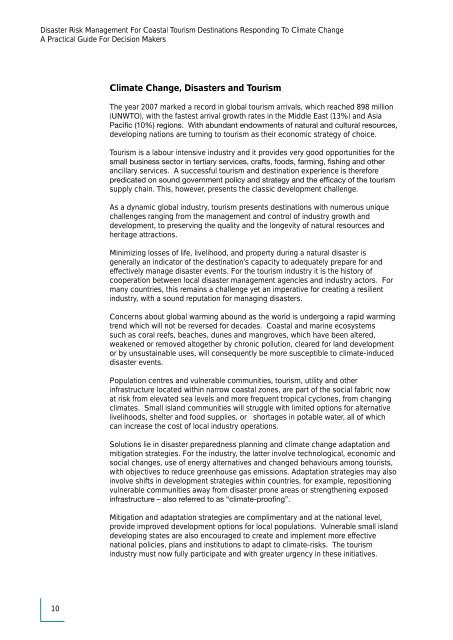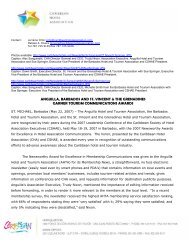Disaster Risk Management for Coastal Tourism - Caribbean Hotel ...
Disaster Risk Management for Coastal Tourism - Caribbean Hotel ...
Disaster Risk Management for Coastal Tourism - Caribbean Hotel ...
You also want an ePaper? Increase the reach of your titles
YUMPU automatically turns print PDFs into web optimized ePapers that Google loves.
<strong>Disaster</strong> <strong>Risk</strong> <strong>Management</strong> For <strong>Coastal</strong> <strong>Tourism</strong> Destinations Responding To Climate Change<br />
A Practical Guide For Decision Makers<br />
Climate Change, <strong>Disaster</strong>s and <strong>Tourism</strong><br />
The year 2007 marked a record in global tourism arrivals, which reached 898 million<br />
(UNWTO), with the fastest arrival growth rates in the Middle East (13%) and Asia<br />
<br />
developing nations are turning to tourism as their economic strategy of choice.<br />
<strong>Tourism</strong> is a labour intensive industry and it provides very good opportunities <strong>for</strong> the<br />
<br />
ancillary services. A successful tourism and destination experience is there<strong>for</strong>e<br />
<br />
supply chain. This, however, presents the classic development challenge.<br />
As a dynamic global industry, tourism presents destinations with numerous unique<br />
challenges ranging from the management and control of industry growth and<br />
development, to preserving the quality and the longevity of natural resources and<br />
heritage attractions.<br />
Minimizing losses of life, livelihood, and property during a natural disaster is<br />
generally an indicator of the destination’s capacity to adequately prepare <strong>for</strong> and<br />
effectively manage disaster events. For the tourism industry it is the history of<br />
cooperation between local disaster management agencies and industry actors. For<br />
many countries, this remains a challenge yet an imperative <strong>for</strong> creating a resilient<br />
industry, with a sound reputation <strong>for</strong> managing disasters.<br />
Concerns about global warming abound as the world is undergoing a rapid warming<br />
trend which will not be reversed <strong>for</strong> decades. <strong>Coastal</strong> and marine ecosystems<br />
such as coral reefs, beaches, dunes and mangroves, which have been altered,<br />
weakened or removed altogether by chronic pollution, cleared <strong>for</strong> land development<br />
or by unsustainable uses, will consequently be more susceptible to climate-induced<br />
disaster events.<br />
Population centres and vulnerable communities, tourism, utility and other<br />
infrastructure located within narrow coastal zones, are part of the social fabric now<br />
at risk from elevated sea levels and more frequent tropical cyclones, from changing<br />
climates. Small island communities will struggle with limited options <strong>for</strong> alternative<br />
livelihoods, shelter and food supplies, or shortages in potable water, all of which<br />
can increase the cost of local industry operations.<br />
Solutions lie in disaster preparedness planning and climate change adaptation and<br />
mitigation strategies. For the industry, the latter involve technological, economic and<br />
social changes, use of energy alternatives and changed behaviours among tourists,<br />
with objectives to reduce greenhouse gas emissions. Adaptation strategies may also<br />
involve shifts in development strategies within countries, <strong>for</strong> example, repositioning<br />
vulnerable communities away from disaster prone areas or strengthening exposed<br />
<br />
Mitigation and adaptation strategies are complimentary and at the national level,<br />
provide improved development options <strong>for</strong> local populations. Vulnerable small island<br />
developing states are also encouraged to create and implement more effective<br />
national policies, plans and institutions to adapt to climate-risks. The tourism<br />
industry must now fully participate and with greater urgency in these initiatives.<br />
10








